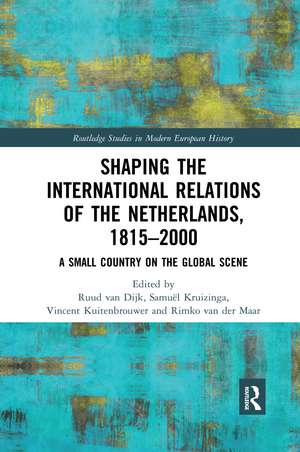Shaping the International Relations of the Netherlands, 1815-2000: A Small Country on the Global Scene: Routledge Studies in Modern European History
Editat de Ruud Van Dijk, Samuël Kruizinga, Vincent Kuitenbrouwer, Rimko van der Maaren Limba Engleză Paperback – 14 aug 2020
| Toate formatele și edițiile | Preț | Express |
|---|---|---|
| Paperback (1) | 388.13 lei 43-57 zile | |
| Taylor & Francis – 14 aug 2020 | 388.13 lei 43-57 zile | |
| Hardback (1) | 1001.84 lei 43-57 zile | |
| Taylor & Francis – 2 mar 2018 | 1001.84 lei 43-57 zile |
Din seria Routledge Studies in Modern European History
-
 Preț: 341.57 lei
Preț: 341.57 lei - 9%
 Preț: 934.96 lei
Preț: 934.96 lei -
 Preț: 324.89 lei
Preț: 324.89 lei -
 Preț: 288.81 lei
Preț: 288.81 lei -
 Preț: 311.41 lei
Preț: 311.41 lei -
 Preț: 350.13 lei
Preț: 350.13 lei - 9%
 Preț: 935.40 lei
Preț: 935.40 lei -
 Preț: 326.60 lei
Preț: 326.60 lei - 18%
 Preț: 1057.09 lei
Preț: 1057.09 lei - 18%
 Preț: 1124.39 lei
Preț: 1124.39 lei - 30%
 Preț: 846.50 lei
Preț: 846.50 lei -
 Preț: 367.27 lei
Preț: 367.27 lei - 18%
 Preț: 1056.28 lei
Preț: 1056.28 lei - 18%
 Preț: 1062.98 lei
Preț: 1062.98 lei - 28%
 Preț: 818.71 lei
Preț: 818.71 lei - 15%
 Preț: 461.03 lei
Preț: 461.03 lei -
 Preț: 430.43 lei
Preț: 430.43 lei - 18%
 Preț: 942.65 lei
Preț: 942.65 lei -
 Preț: 452.15 lei
Preț: 452.15 lei - 18%
 Preț: 1113.16 lei
Preț: 1113.16 lei - 31%
 Preț: 765.19 lei
Preț: 765.19 lei - 18%
 Preț: 1113.16 lei
Preț: 1113.16 lei - 31%
 Preț: 764.20 lei
Preț: 764.20 lei - 18%
 Preț: 1183.71 lei
Preț: 1183.71 lei - 18%
 Preț: 910.22 lei
Preț: 910.22 lei - 18%
 Preț: 1108.37 lei
Preț: 1108.37 lei - 18%
 Preț: 1113.16 lei
Preț: 1113.16 lei - 18%
 Preț: 1004.20 lei
Preț: 1004.20 lei - 18%
 Preț: 1055.51 lei
Preț: 1055.51 lei - 30%
 Preț: 826.43 lei
Preț: 826.43 lei -
 Preț: 485.46 lei
Preț: 485.46 lei - 18%
 Preț: 1112.21 lei
Preț: 1112.21 lei - 30%
 Preț: 796.11 lei
Preț: 796.11 lei - 18%
 Preț: 2219.12 lei
Preț: 2219.12 lei - 30%
 Preț: 822.36 lei
Preț: 822.36 lei - 18%
 Preț: 1057.75 lei
Preț: 1057.75 lei - 31%
 Preț: 736.38 lei
Preț: 736.38 lei - 18%
 Preț: 1066.09 lei
Preț: 1066.09 lei - 31%
 Preț: 764.20 lei
Preț: 764.20 lei - 18%
 Preț: 1058.65 lei
Preț: 1058.65 lei -
 Preț: 276.30 lei
Preț: 276.30 lei -
 Preț: 436.95 lei
Preț: 436.95 lei -
 Preț: 442.12 lei
Preț: 442.12 lei - 18%
 Preț: 703.93 lei
Preț: 703.93 lei - 18%
 Preț: 1116.27 lei
Preț: 1116.27 lei
Preț: 388.13 lei
Nou
Puncte Express: 582
Preț estimativ în valută:
74.29€ • 80.72$ • 62.45£
74.29€ • 80.72$ • 62.45£
Carte tipărită la comandă
Livrare economică 21 aprilie-05 mai
Preluare comenzi: 021 569.72.76
Specificații
ISBN-13: 9780367592561
ISBN-10: 0367592568
Pagini: 264
Dimensiuni: 156 x 234 x 18 mm
Greutate: 0.42 kg
Ediția:1
Editura: Taylor & Francis
Colecția Routledge
Seria Routledge Studies in Modern European History
Locul publicării:Oxford, United Kingdom
ISBN-10: 0367592568
Pagini: 264
Dimensiuni: 156 x 234 x 18 mm
Greutate: 0.42 kg
Ediția:1
Editura: Taylor & Francis
Colecția Routledge
Seria Routledge Studies in Modern European History
Locul publicării:Oxford, United Kingdom
Public țintă
PostgraduateCuprins
Introduction: A Small State on the Global Scene, Ruud van Dijk, Vincent Kuitenbrouwer, Samuël Kruizinga, Rimko van der Maar 1. National interest versus common interest: The Netherlands and the liberalization of Rhine navigation at the Congress of Vienna, 1814-1815, Joep Schenk 2. Algiers burning: The United Kingdom of the Netherlands and the post-Napoleonic European order of peace and security, Erik de Lange 3.Joining the International War Against Anarchism: The Dutch Police and its Push Towards Transnational Cooperation, 1880-1914, Beatrice de Graaf and Wouter Klem 4. ‘You act too much as a journalist and too little as a diplomat’: Pieter Geyl, The National Bureau for Documentation on the Netherlands and Dutch public diplomacy, 1919-1935, Pelle van Dijk 5. Between the League of Nations and Europe: Multiple Internationalism and Interwar Dutch Civil Society, Anne-Isabelle Richard 6. Rethinking small state security: Dutch alignment in the 1940’s compared to Swedish neutrality, Susanna Erlandsson 7. Expropriating American Power: Dutch Clientelism and the East Indies Crises, 1941-1948, David J. Snyder 8. The Guardians: An International History of the Dutch and ‘Hague Law’, 1944-1949, Boyd van Dijk 9. Attracted and repelled: transnational relations between civil society and the state in the history of the fair trade movement since the 1960s, Peter van Dam 10. Joop den Uyl, the emergence of the European Council and the expanding role of the Prime Minister in Dutch foreign policy, 1973-1977, Jan-Willem Brouwer 11. Taking Stock of a ‘Ruslandganger’: Ernst H. van Eeghen, De Burght Foundation, and Private Diplomacy in East-West Relations during the 1980s and 1990s, Giles Scott-Smith Conclusions and Outlook: Small States on the Global Scene, Ruud van Dijk, Vincent Kuitenbrouwer, Samuël Kruizinga, Rimko van der Maar
Notă biografică
Ruud van Dijk, Samuël Kruizinga, Vincent Kuitenbrouwer and Rimko van der Maar are specialists in the history of international relations working at the Department of History, European Studies & Religious Studies of the University of Amsterdam.
Descriere
This book seeks to launch a new research agenda for the historiography of Dutch foreign relations during the nineteenth and twentieth centuries. It does so in two important ways. First, it broadens the analytical perspective to include a variety of non-state actors beyond politicians and diplomats. Second, it focuses on the transnational connect
